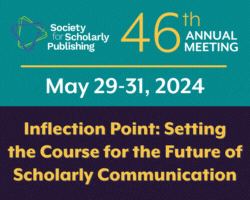Our 2020 webinar series resumes with “The Future of Preprints: Coronavirus as a Case Study,” happening Tuesday, September 22, at 11 am EDT. Registration for the event remains open with a discount available for SSP members.
Preprints, the early sharing of research that has not yet been peer reviewed, have been established in disciplines such as physics and economics for decades and have been growing in popularity across many new disciplines such as biology and chemistry over more recent years. In planning this webinar we wanted to look at the future- what people thought the future of preprints would look like.
Then, when COVID-19 took over all of our lives, it also took over the preprint world. Many researchers wanted to quickly share COVID-19 research and move scientific discovery forward in the global efforts to fight this virus. They found preprints a useful means of doing that and we saw a surge in the posting of Covid-19 related preprints. Because of COVID-19 the adoption of medical preprints accelerated, in some ways moving us quickly to what the future of preprints might look like. Thus, it seemed like a timely case study through which to think about reasonable projections of what the future of preprints will look like.
We also thought this worked as a good case study because the role being played by, and the general public’s reception and perception of, preprints in sharing developing information about COVID-19 are representative of challenges that need to be addressed for all scholarly publishing, in how to appropriately translate and disseminate scientific findings that are relevant to the lay public.
Webinar speaker Shirley Decker-Lucke is Content Director at SSRN. She recently took the time to answer a few questions about the upcoming webinar:
Who is the intended audience for this webinar and why should they attend?
People who are living through this pandemic and thinking about how we can best quickly share research and information to fight the pandemic.
Scholarly publishing decision-makers and influencers involved in business, editorial, and production.
Why is this topic important and timely? Is there a particular aspect of this topic that is noteworthy?
We are in the midst of a global pandemic, and the research world is coming together in new, fast, collaborative ways to quickly pool resources and fight. Medical COVID-19 preprints are one example of how this is being done.
What do the selected speakers bring to the discussion?
Our four panelists represent four distinct “personas,” to provide a well-rounded discussion:
AUTHOR- A researcher who uses and relies on preprints to improve his own publications and advance research in his clinical practice area.
READER- A clinician-researcher currently leading the curation and commenting on emerging content related to COVID-19 for an internationally-renowned university hospital.
JOURNAL-An editorial leader for leading international medical journal that has made preprints an integral part of their process.
PREPRINT SERVER-A representative of a leading preprint server that has long supported non-medical fields and now hosts medical content as well.
What can attendees expect from the webinar?
We are hoping attendees will learn more about preprints, will hear from four different perspectives on what others think the future role of preprints within the scholarly communication world will be, and will be prompted to reflect on their own views of what the future of preprints will be in general, and should be for their own publishing work.
There will be brief presentations from each of the four panelists, to offer data and perspective on several key points around preprints, to be followed by a moderated discussion among the panelists, including questions from attendees.
What do you hope attendees will take away from the webinar?
I’m hoping that attendees hear different perspectives on a key strength of preprints- quickly sharing important research- and a key concern with preprints- they aren’t peer reviewed and thus shouldn’t be treated as trustworthy as peer reviewed published articles. COVID-19 presents extreme examples of ways in which this benefit is important (we need to end this pandemic quickly so fewer people die) and this concern is serious (we don’t want faulty research mistakenly being treated as trustworthy; we don’t want media reporting on preliminary preprints as if they were peer reviewed).
News contribution by SSP member, Heather Kotula. Heather is Vice President of Marketing and Communications for Access Innovations, Inc.




Join the Conversation
You must be logged in to post a comment.